—
Housing, Stadiums, and Priorities – Some Links, Studies, Research for Thought — Re: [TakomaDC] Fw: Metro Site
I mentioned I’d share some links, so I took some time to dig a bit. Over the years, I’ve come across pieces that have shaped how I think about housing in DC—and I hope some of this can spark useful conversation, whether you agree or not.
We all know DC is facing an increasingly dire and unaffordable housing crisis. I believe the continued focus on building privatized Class A studios and one-bedrooms isn't the solution—it often drives costs up, not down. I’ve included some reports below that speak to that point.
What I do believe can help turn the tide is developing a robust Social Housing ecosystem.
Here’s two key reasons (among others) why:
-
Social Housing is insulated from the volatility of federal investment cycles.
-
It’s a self-sustaining, municipally owned model that can actually drive costs down by making construction and financing more efficient and the profits are reinvested back into the project.
But as to the links below, they aren’t meant to be the final word—but rather a place to start (or continue) a shared learning process.
We all want to house families of all incomes, and that especially means prioritizing those who’ve been left behind in DC’s boom times over the last 15+ years.
And, some folks including me want to ensure public land, like at Metro sites, don't perpetuate the same gentrification problems but seek to repair the displacement harms and racism of the past. The status quo #BuildingAsUsual won't result in this objective unfortunately as the track record shows.
All of these important questions and concerns come at a time when we’re seeing some questionable priorities from city leadership.
For example, this week brought reports that the Mayor and the billionaire-owned Washington Football Team are in closed-door negotiations for a new $3-billion RFK stadium. This could leave taxpayers on the hook for hundreds of millions—possibly over a billion—for luxury play time, while housing costs remain sky-high. Link to story
Nearly simultaneously, the Mayor also announced “extraordinary measures” to cut government spending—freezing hiring, considering furloughs, and potential closures of public facilities. Link here
It's so strange to be discussing something so fundamentally important as shelter for humans and solutions therein when our government over the past two budget cycles has found tremendous priority, time, and DC money to fund billionaires' dream play spaces.
Nonetheless, here are a few links to chew on—hoping they help deepen the conversation:
- “Rent Comes Down for the Wealthy, While Rising for the Rest, Surplus of new housing is driving down prices at the top of the market” by Will Parker, Wall Street Journal, dated February 6, 2024, https://archive.ph/3ARmb
- “D.C. sues landlords, RealPage, alleges collusion to increase rents” by Justin Wm. Moyer, in the Washington Post, published on November 1, 2023, https://archive.ph/u4vTk
- “We build more housing, and the price goes up,” DC Zoning Chairman, May 10, 2018, DC Zoning Transcript, https://app.dcoz.dc.gov/Content/Search/Download.aspx?exhibitid=148734, Video link: https://www.youtube.com/watch?v=oTFXDTg8KPg
-
Even YIMBY studies show: “For rental buildings that are 500-1000 feet away from new high-rises, their residential rents do decrease but not significantly after the new high-rise completion. … [And,] the rent decrease for low-end rental buildings is not significant in the medium-term.” https://blocksandlots.com/wp-content/uploads/2020/02/Do-New-Housing-Units-in-Your-Backyard-Raise-Your-Rents-Xiaodi-Li.pdf
-
The DC Citizens Forum: Washington Was An Icon Of Black Political Power. Then Came Gentrification, by NCRC, January 29, 2024, https://ncrc.org/the-dc-citizens-forum-washington-was-an-icon-of-black-political-power-then-came-gentrification/
- Colby King on Black Displacement from Washington D.C. http://www.dc4reality.org/updates/722
- Review of “Before Gentrification: The Creation of DC’s Racial Wealth Gap” by Tanya Maria Golash-Boza, Review published by Oxford Academic, August 30, 2024, “Golash-Boza’s narrative connects the thread of how Black residents, once abandoned in declining neighborhoods, were taken off the streets by incarceration and displaced by gentrification”, https://academic.oup.com/sf/article-abstract/103/2/e15/7746085
- DC Census Shocker: Ward 1 Shows Profuse Black Displacement While Ward 3 Has Grown in Black Population; Rest of City (except Wards 7, 8) Loses Significant Numbers of Black Residents & Families http://www.dc4reality.org/updates/page/5
- D.C. development has soared under Bowser. So have housing costs. Washington Post, June 16, 2022, https://archive.ph/b7Lpi
- DC’s Unaffordable “Affordable” Housing Problem http://www.dc4reality.org/updates/page/4
- Inclusionary Zoning Explained, Part 1 (AMI) :: https://www.youtube.com/watch?v=Y3_Hf_84Mn0
- IZ Explained, Part 2 (Waiting Lists & Funding) :: https://www.youtube.com/watch?v=nbvxR-r4lyw
- 1 in 4 public housing units sit vacant during D.C. affordability crisis, Washington Post, Steve Thompson, October 19, 2022, https://archive.ph/lNl5M
- The Need for a Green New Deal for Housing in DC Reaching Critical Point http://www.dc4reality.org/updates/786
###
Still Prescient Thesis — Selling Shelters: Public Property Gentrification in Washington, D.C.
(c) 2008
By Katie Wells, PhD Candidate, Department of Geography, Syracuse University
phenomenon within neoliberalism and explore its inner logic of revaluation and dispossession, which I contend work respectively through mechanisms like historic preservation and public property disposal. Franklin School shelter’s genesis and the resistance that has stalled its sale illuminate the tensions under advanced capitalism between homelessness and gentrification in particular and struggles over accumulation and social justice in general. The empirical work is based on literature reviews, archival research, open-ended interviews, and cartographic methodologies.
DC Dems, MAGA Republicans: Two Sides of the Same Coin?
On December 17, 2024, the DC Council gave final approval to the Downtown Arena Revitalization Act, locking in over half a billion dollars in taxpayer-funded renovations for Capital One Arena. The deal ensures the Washington Capitals and Wizards stay in DC through at least 2050.
That means the Mayor and your City Council members (all Democrats or “independent” Democrats) signed off on this massive capital investment for a billionaire’s play space—just weeks after Donald Trump was re-elected. Your tax dollars on corporate welfare layaway, and they’re not done yet.
With the new year and 2025 inauguration, Mayor Bowser and several high-profile Councilmembers kicked off a tour cheering on the return of the Washington Football Team to a revitalized RFK Stadium—a project that could cost DC taxpayers hundreds of millions, if not a billion dollars, to fund yet another luxury sports venture.
Then in February, the U.S. President demanded DC city officials address the growing “unsightly” tent encampments. DC Mayor, Muriel Bowser acknowledged Trump's directive and on March 7, 2025, she sent in bulldozers to destroy encampments sheltering DC residents already displaced by the city’s worsening affordability crisis—giving unhoused residents just one day's notice to vacate, a clear departure from the city’s usual 14-day policy. She then turned those machines on Black Lives Matter plaza that has really upset Jamie Foxx among others.
And now, that same DC Mayor and the whole gaggle of DC City Councilmembers stand before a Republican-controlled federal government, pleading for mercy—asking Congress not to slash $1 billion from DC’s local budget, warning of devastating impacts to human services and vital programs.
The gaslighting feels staggering.
Year after year, DC’s leaders prioritize giving away public property and financing to construct stadiums, luxury condos, and high-end hotels—while barely maintaining scraps of funding for truly affordable housing. Worse yet, they continue to annually flirt with cutting housing vouchers, emergency rental assistance, and critical social services that working-class and poor residents rely on for survival, including the most recent legislation making it easier for slumlords to evict struggling working DC families from their homes (warning: link to gov spin website).
Democrats, Republicans—two sides of the same coin?
—
DC Dems, MAGA Republicans: Two Sides of the Same Coin?
On December 17, 2024, the DC Council gave final approval to the Downtown Arena Revitalization Act, locking in over half a billion dollars in taxpayer-funded renovations for Capital One Arena. The deal ensures the Washington Capitals and Wizards stay in DC through at least 2050.
That means the Mayor and your City Council members (all Democrats or “independent” Democrats) signed off on this massive capital investment for a billionaire’s play space—just weeks after Donald Trump was re-elected. Your tax dollars on corporate welfare layaway, and they’re not done yet.
With the new year and 2025 inauguration, Mayor Bowser and several high-profile Councilmembers kicked off a tour cheering on the return of the Washington Football Team to a revitalized RFK Stadium—a project that could cost DC taxpayers hundreds of millions, if not a billion dollars, to fund yet another luxury sports venture.
Then in February, the U.S. President demanded DC city officials address the growing “unsightly” tent encampments. DC Mayor, Muriel Bowser acknowledged Trump's directive and on March 7, 2025, she sent in bulldozers to destroy encampments sheltering DC residents already displaced by the city’s worsening affordability crisis—giving unhoused residents just one day's notice to vacate, a clear departure from the city’s usual 14-day policy. She then turned those machines on Black Lives Matter plaza that has really upset Jamie Foxx among others.
And now, that same DC Mayor and the whole gaggle of DC City Councilmembers stand before a Republican-controlled federal government, pleading for mercy—asking Congress not to slash $1 billion from DC’s local budget, warning of devastating impacts to human services and vital programs.
The gaslighting feels staggering.
Year after year, DC’s leaders prioritize giving away public property and financing to construct stadiums, luxury condos, and high-end hotels—while barely maintaining scraps of funding for truly affordable housing. Worse yet, they continue to annually flirt with cutting housing vouchers, emergency rental assistance, and critical social services that working-class and poor residents rely on for survival, including the most recent legislation making it easier for slumlords to evict struggling working DC families from their homes (warning: link to gov spin website).
Democrats, Republicans—two sides of the same coin?
—
[ChevyChaseCommunity] DC Zoning Commission’s Vote on Chevy Chevy Commercial District January 30
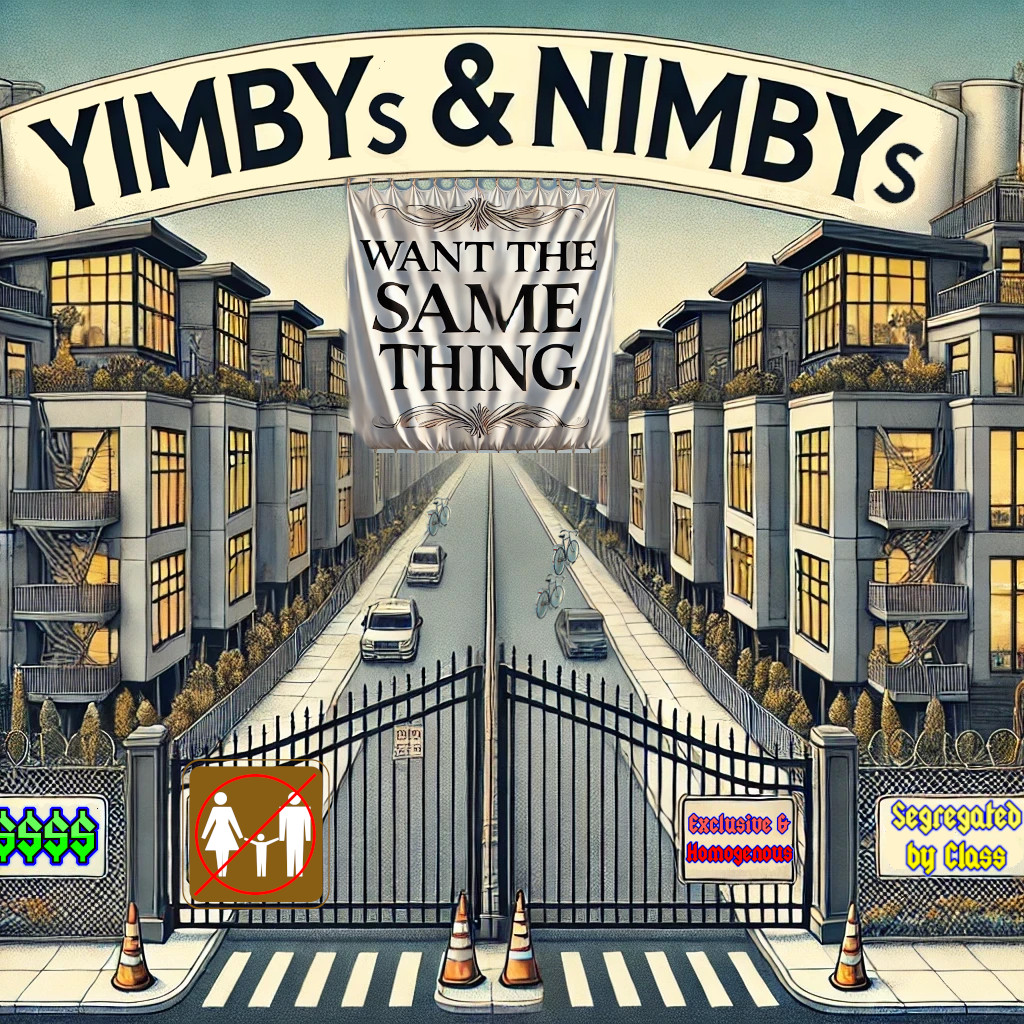

- More than half of DC's primary “affordable” housing units (called IZ) have been built to serve the 80% AMI/MFI bracket of IZ-registered households (~1,050 / ~2,000 IZ units set at 80% MFI).
- 65% of the IZ units were built for mostly single-persons, perhaps some two-person households (1,300 studio & 1-bedroom units had been built).
- This means the vast majority of DC's “affordable” units are for professionals making $85,000/year.
- More than 4,600 IZ registrants are 3+ person households (families) vying for just one hundred and twenty-three (123) three+ bedroom IZ units built.
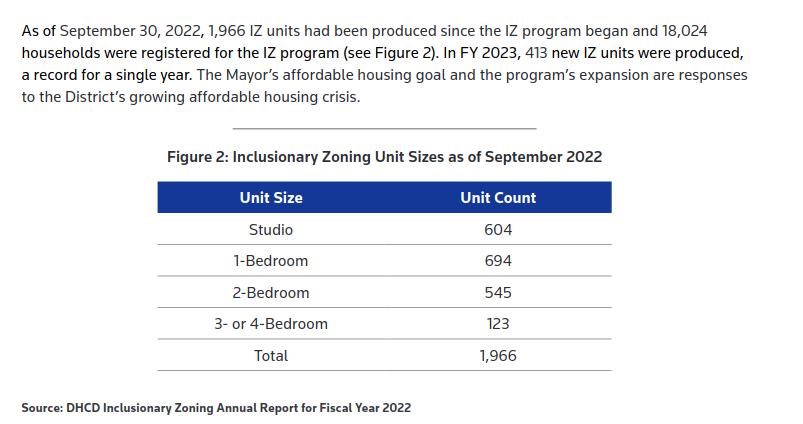
For those clamoring for more unaffordable IZ units, I can assure you they will be peppered throughout all the new density up and down Wisconsin, Connecticut, etc.

“I can tell you, some of the concerns that I've had, not just with this case, I hear all this about affordable housing and we talk about it all the time and don't get me started. [I'm] really getting on this because from my standpoint, I've said this previously, [on] affordable housing, it seems like the more housing we get the more the price goes up. I hear the argument Mr. Dettman, that if you increase the supply, [let me] make sure I got my economics right, if you increase the supply the cost comes down. [But] we increase the supply and [the price of housing] goes up. That's Anthony Hood's opinion. I'm a realist. I'm going about what I see, not what I hear, because if I go by what I hear, yea everything is affordable.”

For example Rondell Jordan said (
https://www.youtube.com/live/R44Nifxaw6E?feature=shared&t=14648):(4:05:44) “The inclusionary zoning program, touted as a solution to housing affordability, has been nothing but a smokescreen for gentrification. IZ has done more to fuel displacement of Black residents than to stop it.”
(4:06:14) “The district’s flagship affordable housing program amounts to nothing more than modern-day redlining. Instead of red lines on a map, we now have affordability requirements rigged to exclude Black residents.”
On Thursday, February 6, 2025, John Wheeler via groups.io <johnwheeler.dc=gmail.com@groups.io> wrote:
There was no misstatement in my post. ANCs are statutorily required to provide at least two forms of notice for meetings. While DC OAG has previously stated in prior guidance letters that posting notice via email listserv is acceptable, “posting a meeting notice on the ANC website could qualify as another 'manner approved by the Commission' as long as the ANC approved it by vote.” ANC 3/4G's bylaws do not specify that valid notice includes posting on the ANC's website. So, unless the ANC specifically voted at the 1/27 meeting to provide notice via its website of the 1/29 special meeting, then the special meeting would be invalid.And it is nonsensical to argue that the meeting was urgent because the Zoning Commission was meeting the next day to decide the case that was the subject of the urgent meeting. Yet the ANC knew of the meetings months before and had discussed it months before. The urgency was created by the ANC failure to act sooner, not a lack of notice.
As to the substance of the ANC’s last second resolution:
1. The notion that there is anything that has not been said in testimony already given before the Zoning Commission or in the years of public discussion that might have been said in a contested hearing doesn’t make sense—they heard from the ANC and affected people, they just were not convinced that the ANC’s concerns outweighed the goals of the Comprehensive Plan and the affordable housing crisis.
2. Chairman Hood’s question concerning the negative reaction to affordable housing in Rock Creek West is perfectly legitimate. Many people are asking the same thing.3. The response to my post shows a lack of knowledge of how a contested hearing is conducted. Parties (that includes the ANC) have a limited amount of time to present a case. A party cannot cross-examine the decision makers (members of the Zoning Commission). A party can cross examine witnesses. That also means that ANC commissioners, assuming they are witnesses, can be cross-examined. The ANC would be required to submit well in advance of the hearing, its list of witnesses, a statement of what each witness will say, and what it intends to prove. To do it right, is a lot of work. However, in this case, I cannot imagine there would be any testimony that has not already been given over and over at the Rulemaking hearing. So, in the end, it is a big waste of lots of people’s time with the Zoning Commission reaching the same decision.John WheelerTo correct the misstatements of a prior post, first, that ANC 3/4G illegally conducted its January 29th meeting, DC Code § 1-309.11(c) allows for ANC meetings to be held on short notice “. . . in the case of an emergency or for other good cause articulated in the notice.” The situation was critically time-sensitive given that the Zoning Commission was to meet the next day to ratify its earlier decisions in case 23-25, addressing the rezoning of upper Connecticut Avenue from Livingston St. to Chevy Chase Circle. The ANC gave notice to the community and approximately 60 participants attended the meeting online, which is in keeping with usual online attendance.
With respect to the ANC’s resolution noting bias in the case by Anthony Hood, Chairman of the Zoning Commission, his remarks are available on YouTube, as cited below.
November 9, 2023 (https://www.youtube.com/watch?v=8A0ZQjAbjYs, starting at 2:06:50): “…every time there's something done in uh West Rock Creek there's always much much opposition and I want to submit that to the to the residents of Rock Creek West the whole other City we're trying to make it affordable for people to live in what is it about affordable housing that Rock Creek West and I know this is probably gonna give me they're gonna come after me but that's fine I'm used to it now what is it about Rock Creek West it always there's a problem with and not this not my first time saying it's always a problem with affordable housing what is it really that's trying to happen there I'm make no accusation I'm just curious uh I know there's some maybe some zoning issues but it's whenever it's affordable housing I notice there's a lot of opposition that gets drummed up and that's not a question for office of planning that's for the public so I will be asking that question as if we move if it's set down.”
April 29, 2024 (https://www.youtube.com/watch?v=8MiDnfH9EqI, starting at 2:52:00): “So why is it that every time something comes up, the word of affordable housing comes up in Ward Three, it’s a major issue? Am I missing something here? Why is it that the rest of the city accepts it and does it, but when it comes to this area, it’s always something?”
May 23, 2024 (https://www.youtube.com/watch?v=T18uiysiL0g, starting at 2:59:00): A Chevy Chase resident asks Chair Hood to retract his remarks about Ward Three. At 3:12:30 Chair Hood responds to her request, saying that he stands by his comments about Ward Three. “Every time you talk about affordable housing, there seems to be a problem.”
The Zoning Commission’s decision to conduct rulemaking as opposed to a contested hearing process for case 23-25 effectively precluded the ANC from cross-examining Chair Hood to challenge his assertions. His bias against our community could have played a role in the Zoning Commission’s decision to make it a rulemaking case in the first place, limiting the ANC’s involvement. Furthermore, it could have played a role in the Zoning Commission’s failure to give proper notice to the ANC of the November 9, 2023, hearing referenced above when the Zoning Commission “set down” the case as rulemaking. That was the one and only opportunity for the ANC to argue for a contested case at the set down.
Consequently, far from addressing “in great detail” concerns raised by the ANC about case 23-25, the Zoning Commission followed a process that by design prevented the ANC from going into great detail. It not only restricted our ability to question Chair Hood on his comments, but also to represent in full the views of our constituents.
By November 2023, the ANC had just completed the largest survey in its history, probing the opinions of our residents regarding the proposed redevelopment of the Civic Core. These opinions were brushed aside by the Zoning Commission, which gave the ANC hardly more time to testify than DC residents who do not even reside in Chevy Chase.
Surely, the many important issues created by the upzoning of Upper Connecticut Avenue that will irreparably impact the community deserved a full and fair airing before an impartial Zoning Commission. Indeed, all DC residents deserve a fair, unbiased zoning process regardless of which ward they live in.
Liz Nagy
Commissioner (Secretary)
ANC 3/4G-07_._,_._,_
Groups.io Links:
You receive all messages sent to this group.
View/Reply Online (#331462) |
Reply to Group
|
Mute This Topic
| New Topic
To post a message to this listserv, send an email to: ChevyChaseCommunity@groups.io . Put this email address into your contacts list. You do not need to go to the listserv's website in order to post to this forum. The website *does* have a huge archive of messages which every list member should know how to search.Listserv Rules: Sign your full name to messages. When posting emails to the listserv, do not ask for private replies unless selling or giving away items. When replying to an email, send your response to the list so all can benefit and the information can be later retrieved in an archive search. When disagreeing with members, or during contentious discussions only, avoid using `you` and `your` words. Focus on issues, not individuals, unless comments are about public or elected figures doing their jobs. Write short, descriptive subject lines. Use asterisks to *emphasize* a word, not ALL CAPS. Emails will be revised or returned that do not comply with these rules.
To join this group, send your name, home address and telephone numbers, in confidence, to the Listserv Moderators at: ChevyChaseCommunity+owner@Groups.io
Your Subscription | Contact Group Owner |
Unsubscribe
[dc4reality@gmail.com]_._,_._,_
Fwd: [1617 U Street List] When Will We Stop Selling Off Our Future? Re: [adamsmorgan] $146M Loan For Donatelli’s Columbia Heights Apartment Complex Hits Special Servicing
———- Forwarded message ———-
From: Chris R. Otten <crotten2@gmail.com>
Subject: [1617 U Street List] When Will We Stop Selling Off Our Future? Re: [adamsmorgan] $146M Loan For Donatelli's Columbia Heights Apartment Complex Hits Special Servicing
To: adamsmorgan@groups.io
Cc: “Nadeau, Brianne K. (Council)” <bnadeau@dccouncil.gov>, chenderson@dccouncil.gov, kmcduffie@dccouncil.gov, rwhite@dccouncil.gov, abonds@dccouncil.gov, bpinto@dccouncil.us, pmendelson@dccouncil.gov, jlewisgeorge@dccouncil.gov
When Will We Stop Selling Off Our Future?
How many times must we watch public land and air rights handed over by the Mayor and Council, only to be exploited by real estate speculators in pursuit of immense profits? These public land deals—complete with tax abatements and blessed zoning entitlements—quickly enrich fly-by-night land-hucksters peddling the illusion of Inclusionary Zoning (IZ) units and more “market-rate” housing. Meanwhile, they prop up the mercantile class (bankers) at the expense of our public assets, increase displacement pressures, and make a mockery of the basic human right to safe, dignified shelter.
The private real estate market, built on collusion and profiteering, cannot solve the affordable housing crisis it continues to fuel.
Decision-makers with a duty of care to the public must recognize that we cannot build our way out of this crisis with more luxury housing and the woefully inadequate, some say failed “affordable” IZ program.
We need bold policy shifts to decommodify housing, stabilize costs, and ultimately bring them down.
Social housing—a proven model in cities worldwide—offers a real path forward. It’s time to end this cycle of public giveaways and start systemically investing in structurally sound and effective housing policies that prioritize DC's people over some private-developer's profit margins.
The story below is yet another painful reminder of why DC's posture must change. Let’s end the giveaways once and for all.
Chris Otten, SHIMBY
DC's entire housing policy foundations, especially affordable, are built upon the assumption that this project was a run-a-way success. This project receive basically free city land, a tax abatement bailout, allowed to renege on community benefits requirements including affordability, and a zoning free hand.
I was just at a National League of Cities event where everyone was applauding this as the future of housing and public private partnerships.
Let the bailout begin.
William
$146M Loan For Donatelli's Columbia Heights Apartment Complex Hits Special Servicing
The developer of a 373-unit apartment building next to the Columbia Heights Metro station has yet to pay back its loan after it matured in July.
At least two securitized pieces of Donatelli Development’s $146M loan on the Highland Park building at 1400 Irving St. NW were transferred to special servicing in October, according to December servicer commentary in the Morningstar Credit database.
Donatelli didn't respond to a request for comment. The special servicer, CBRE Loan Services, declined to comment.
The property was refinanced for $146M in July 2022, and two pieces of that loan totaling $74M and $30M were sold into commercial real estate collateralized loan obligation pools.
The property was 85% occupied when the loan was issued, and it has since increased to 95%, but it appears the landlord hasn't hit targets for rent increases. The issuer projected the net operating income would reach roughly $9M at stabilization, but the property's latest reported NOI was $7.2M, according to Morningstar.
“It looks like it’s not hitting its plan, and trying to refi in this environment but with this amount of debt was always going to be a challenge,” Morningstar Credit Head of CRE Analytics David Putro told Bisnow.
The 18K SF of ground-floor retail is occupied by Z-Burger, a mediterranean restaurant, a coffee shop and a Lou’s City Bar. The Wawa at the property closed in June 2022, but the company has a corporate guarantee to pay the rent through 2034, according to a Morningstar presale report on one of the loan pieces.
The presale report said Donatelli planned to “increase the multifamily rents, stabilize the residential occupancy, and back-fill the dark Wawa commercial space.”
Highland Park was appraised at $204M when the loan was originated. The property doesn't appear to have any more recent appraisals.
Donatelli completed the project's two phases in 2009 and 2013. The development cost was $70M, according to D.C.'s Office of the Deputy Mayor for Planning and Economic Development, which said 20% of the apartments were reserved as affordable.
The neighborhood surrounding Highland Park has had a few notable closings over the past year. The CVS across 14th Street closed last February, citing crime as the reason. Across Irving Street from the property, the 540K SF DC USA mall saw Petco close last week, while DSW is also set to shutter this month, Popville reported. They follow Five Below’s closure at the mall last January. Just over 81K SF at DC USA is being marketed on LoopNet.
_._,_._,_
Groups.io Links:
You receive all messages sent to this group.
View/Reply Online (#66678) |
Reply to Group | Reply to Sender
|
Mute This Topic
| New Topic
Welcome to the Adams Morgan listserv, founded by JB Fields and Josh Gibson on October 26, 1999. RIP, J.
Onelist begat EGroups begat Yahoo Groups begat Groups.io
List Administrators: Josh Gibson and George Schmitt.
In Adams Morgan we trust.
Your Subscription | Contact Group Owner |
Unsubscribe
[crotten2@gmail.com]_._,_._,_
—
You received this message because you are subscribed to the Google Groups “1617 U street project” group.
To unsubscribe from this group and stop receiving emails from it, send an email to 1617-u-street-project+
To view this discussion visit https://groups.google.com/d/
—
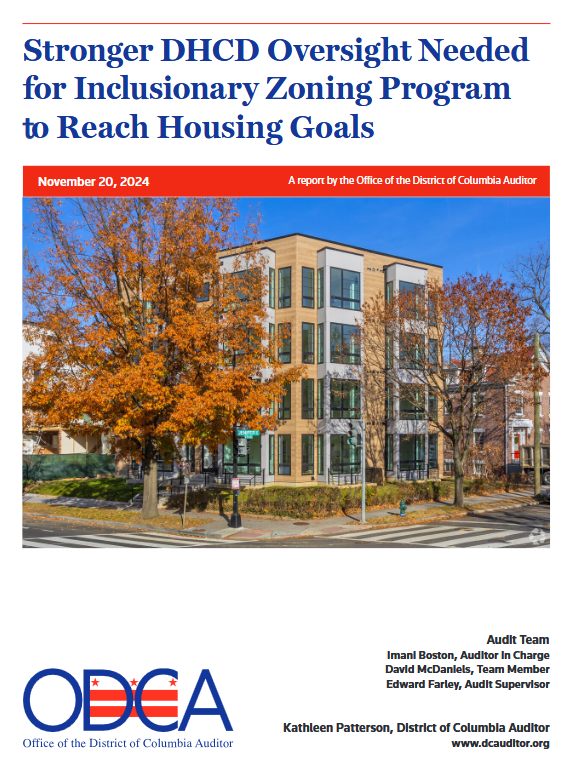
Independent DC Auditor Report on Inclusionary Zoning: Key Highlights & Citations [w/ PDF]


Auditor Report on IZ (“ARIZ”) highlights:
“The Inclusionary Zoning program is a key initiative identified by the Mayor as a pathway toward the afforda ble housing goal of producing 36,000 new housing units and 12,000 new affordable units by 2025.”
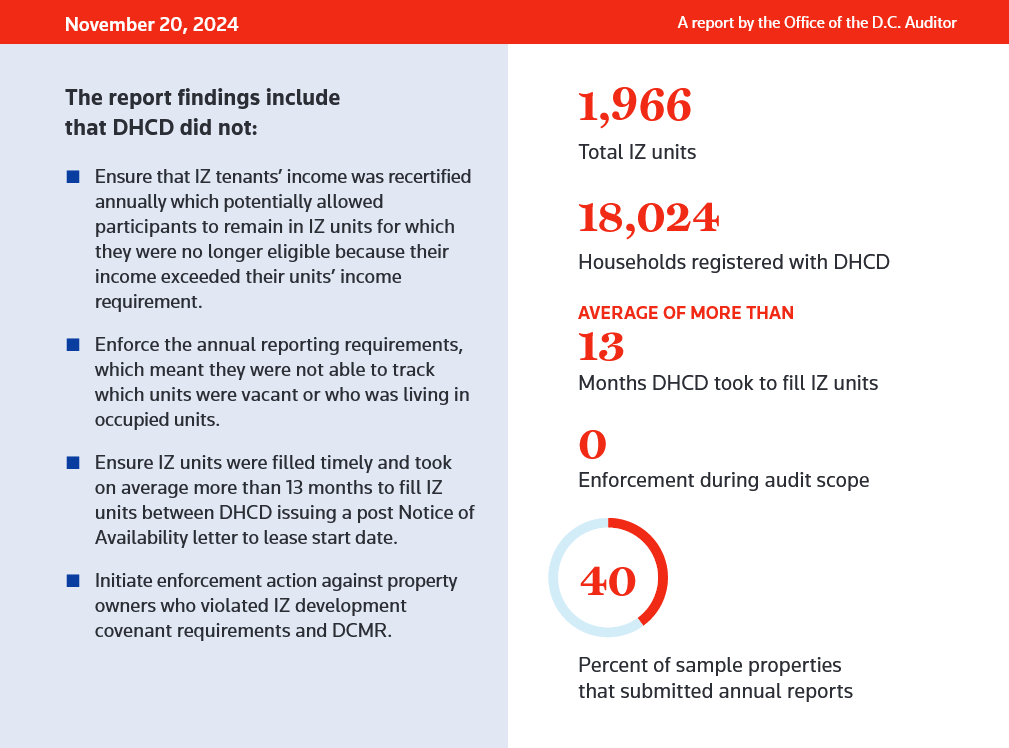
The Inclusionary Zoning (IZ) program in Washington, D.C., was enacted in 2006 and initiated through the DC Comprehensive Plan, which includes policies and actions that set priorities for the District’s land use, public services, infrastructure, and capital investments. A 2008 Mayor’s Order designated DHCD as the authority responsible for administering the IZ program. [The IZ program] became effective in 2009 and the first units came to the housing market in 2011. The regulations state that the IZ program was created to further the Housing Element of the Comprehensive Plan through increasing the amount and expanding the geographic distribution of adequate affordable housing available to current and future residents. … The purpose of the program is to reduce the upward impact that market-rate development can have through increased affordable unit production with the goal of ultimately creating a full range of long-term housing choices for each District household regardless of size and income.
As of September 30, 2022, about 2,000 IZ units had been built. And, about 18,000 households were registered and waiting for an IZ unit.
ARIZ, Figure 2, at Page 3:
Shows that as of Sep. 2022, 65% of the IZ units were built for single-person and some two-person households (1,300 studio & 1-bedroom units had been built).
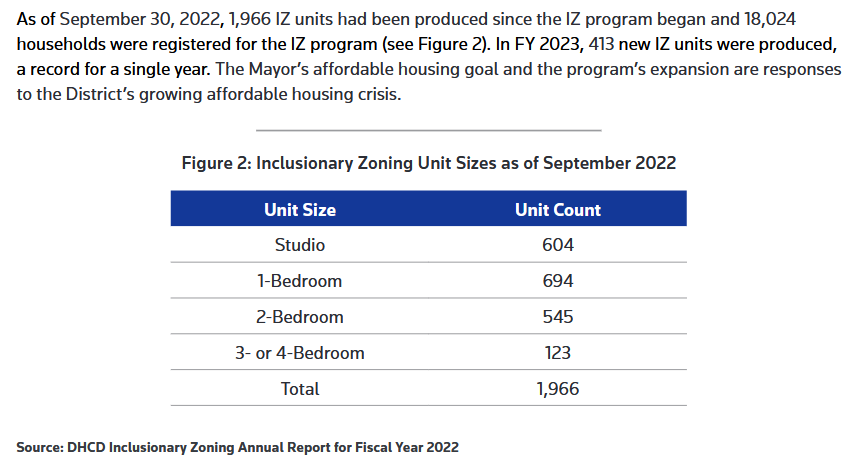
ARIZ, Page 5, 4th bullet-point:
Some of the current IZ participating households may be spending 50% of their income on housing costs (this is unlawfully not affordable).
IZ units sit vacant for an average of about 400 days, some units have sat vacant for 1000 days.
ARIZ at pages 14 – 16:
Since DHCD is not enforcing IZ annual reporting it's hard to track how many IZ units have been vacant or remain vacant since they were built. “Without annual reports, DHCD is unaware of the number of vacant (IZ) units” (at page 16).
ARIZ, pp 17-18:
DHCD did not initiate enforcement action against property owners who violated IZ development covenant requirements. “Despite properties’ non compliance with income recertification, lease renewal, and annual report requirements, DHCD did not initiate enforcement actions against any property owners” (p18).
IZ units serve households making “no more than 50%, 60%, or 80% of the MFI.” MFI stands for Median Family Income and is interchangable with AMI or the Area Median Income. And, according to the Mayor's Inclusionary Zoning Program 2022-2023 Maximum Income, Rent and Purchase Price Schedule, Effective July 1, 2022, figure at page 2, Single-household IZ registrants making $79,700 annually could qualify and live in an “affordable” IZ unit, and, a family of four making $113,850/yr could qualify for a 3-bedroom IZ unit.
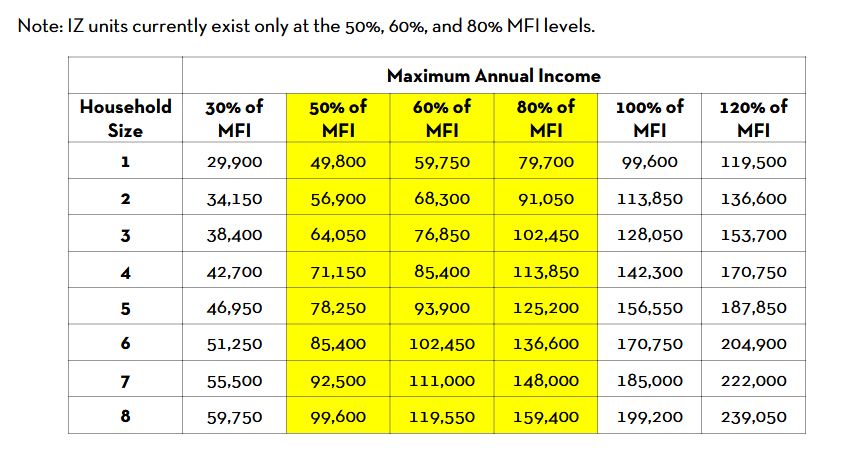
- It's been reported that in Washington, DC, a family of four needs to make $275,000/yr to live “comfortably”.
- As reported by the United Planning Organization, 40,000 of the 44,000 DC households that are rent-burdened (i.e., paying over 30% of their income on housing costs) are extremely low-income, earning 30% AMI or less.
- According to DC Health Matters 2023 Demographics Data, the MFI for Ward One Black residents is $49,148/yr. An affordable rent (i.e., 30% of that MFI) is $14,744/year ($1,229/month).
####
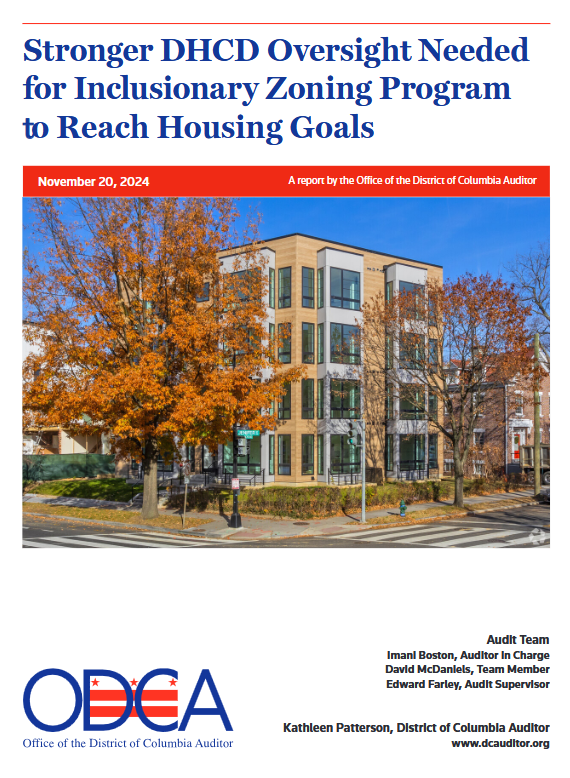
DC Auditor Independent Report on IZ: Key Highlights & Citations

Report, “Stronger DHCD Oversight Needed for Inclusionary Zoning Program to Reach Housing Goals” published by Kathleen Patterson, District of Columbia Auditor, on November 20, 2024, https://dcauditor.wpenginepowered.com/wp-content/uploads/2024/11/Inclusionary.Zoning.Audit_.11.20.24.pdf
—
Auditor Report on IZ (“ARIZ”) highlights:
ARIZ at top of Page 3:
As of September 30, 2022, about 2,000 IZ units had been built. And, about 18,000 households were registered and waiting for an IZ unit.
ARIZ, Figure 2, at Page 3:
Shows that as of Sep. 2022, 65% of the IZ units were built for single-person and some two-person households (1,300 studio & 1-bedroom units had been built).
Looking at Figure 2 at Page 3 of ARIZ and looking at the Mayor's FY2022 IZ Annual Report also at Figure 2:
ARIZ, Page 5, 4th bullet-point:
Some of the current IZ participating households may be spending 50% of their income on housing costs (this is unlawfully not affordable).
ARIZ at page 10:
IZ units sit vacant for an average of about 400 days, some units have sat vacant for 1000 days.
ARIZ at pages 14 – 16:
Since DHCD is not enforcing IZ annual reporting it's hard to track how many IZ units have been vacant or remain vacant since they were built. “Without annual reports, DHCD is unaware of the number of vacant (IZ) units” (at page 16).
ARIZ, pp 17-18:
DHCD did not initiate enforcement action against property owners who violated IZ development covenant requirements. “Despite properties’ non compliance with income recertification, lease renewal, and annual report requirements, DHCD did not initiate enforcement actions against any property owners” (p18).
IZ units serve households making “no more than 50%, 60%, or 80% of the MFI.” MFI stands for Median Family Income and is interchangable with AMI or the Area Median Income. And, according to the Mayor's Inclusionary Zoning Program 2022-2023 Maximum Income, Rent and Purchase Price Schedule, Effective July 1, 2022, figure at page 2, Single-household IZ registrants making $79,000 annually could qualify and live in an “affordable” IZ unit, and, a family of four making $113,850/yr could qualify for a 3-bedroom IZ unit.
2025 New Years Resolution: Replace Failed “IZ” with Green New Deal for Housing
It's Time to Replace the Failed Inclusionary Zoning (IZ) “Affordable” Housing Program with the Green New Deal for Housing in 2025
For more info: www.dc4reality.org/updates
The recent independent DC Auditor report exposes the systemic flaws in the 15-year-old Inclusionary Zoning (IZ) program, highlighting a critical mismatch between the supply of IZ units and the demand for affordable housing. Despite its long policy duration, the program has failed to deliver on its promises:
- Demand Outpaces Supply: With 18,000 households on the waitlist for only 2,000 IZ units, the program leaves tens of thousands without viable housing options.
- Misalignment with Needs: 65% of IZ units are designed for singles, while most families on the waitlist need 3+ bedrooms. This imbalance exacerbates the housing crisis for family-sized households.
- Unlawful “Affordability”: Many current IZ participants spend up to 50% of their income on housing costs, which directly contradicts the legally required principles of affordability (spending no more than 30% of one's income on housing costs).
- Vacancy Loopholes: Developers gain lots of luxury density while leaving IZ units vacant, undermining the public good and sidelining the people the program is meant to serve.
- Delayed Access: With an average move-in time of 13 months, IZ offers no timely relief for families in need.
After 15 years of broken promises, it's clear: Inclusionary Zoning is not the solution.
The Path Forward: Green New Deal for Social Housing in 2025
It’s time to replace the failed IZ model with social housing, a proven alternative that prioritizes people over profits:
- True Affordability: Social housing ensures no household pays more than 30% of their income on rent.
- Family-Focused Solutions: Units are designed to meet the actual needs of the community, especially families requiring larger spaces.
- No Vacant Units: Publicly managed social housing eliminates developer loopholes, guaranteeing occupancy and stability.
- Community Accountability: Social housing is run by public entities or non-profits, ensuring transparency and prioritizing the public good.
- Fast and Equitable Access: By cutting through bureaucratic delays, social housing offers timely solutions for those in need.
2025: A Year for Truly Affordable Housing for All
As we enter 2025, we have an opportunity to embrace social housing as a transformative solution to the District’s housing crisis. It’s time to shift from failed policies to a bold new approach that guarantees housing as a human right.
Let’s move forward with social housing—because everyone deserves a place to call home.
###
See how disingenuous IZ really is and why :: click here :: https://www.youtube.com/watch?v=Y3_Hf_84Mn0
www.dc4reason.org
—

